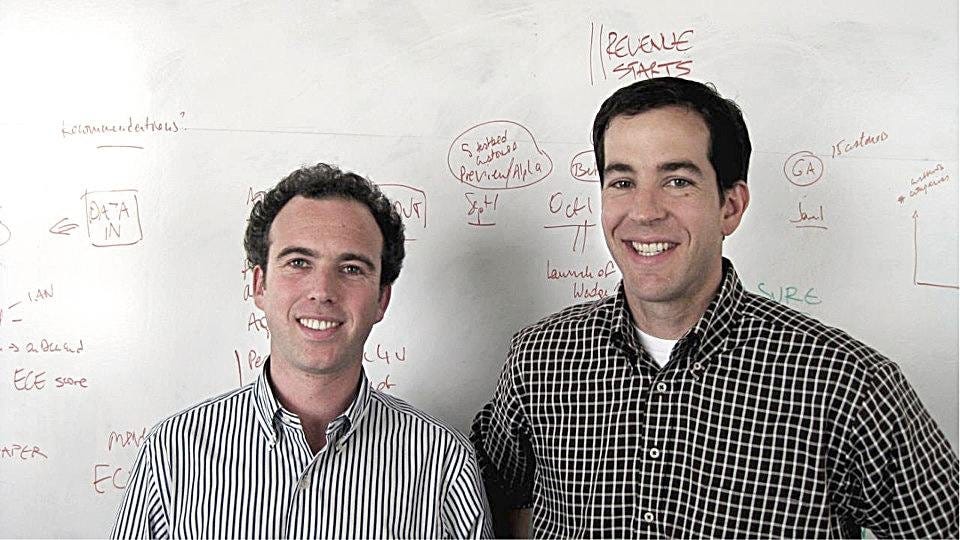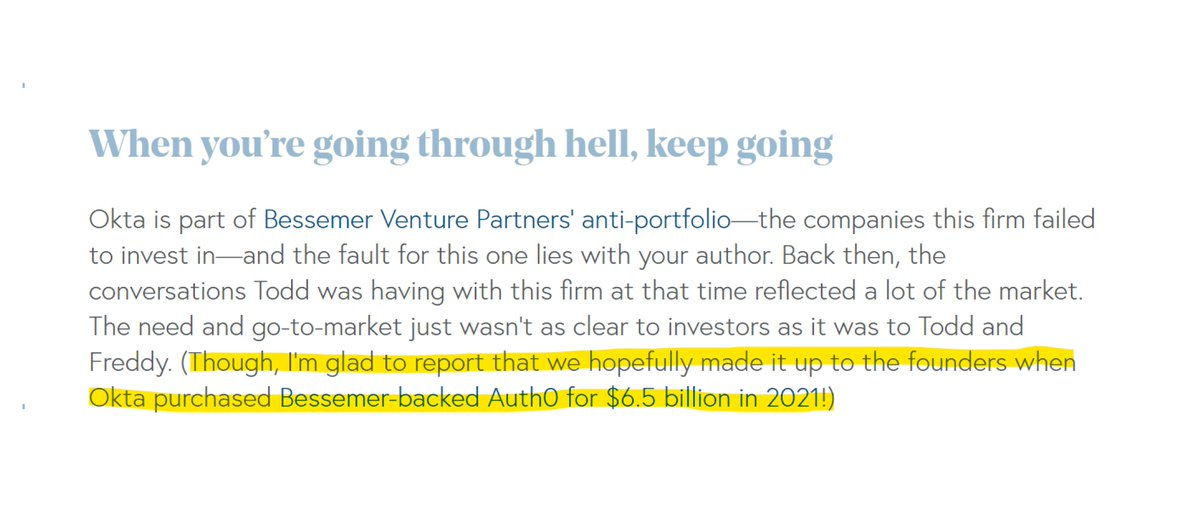#086: The Story of Okta, Product Development Hack, A Friendly Reminder...
One vSaaS breakdown. One biz story. One 'how to'. In your inbox once a week.
Today’s episode is brought to you by the Vertical SaaS Bible, a digital library of 1,000+ industries ranked on segmentation, size, and opportunity, 500+ investors, 100+ playbooks on founding and operating a vertical SaaS business.
Nathan Matthew, Founder & CEO at Roofer.com said this:
"Luke is an expert in all things Vertical SaaS. His case studies and breakdowns of the top Vertical SaaS companies have been instrumental in shaping how I think about building Roofer.com. His insights are a must-read for anyone building or investing in Vertical SaaS."
Last chance to grab it before it is publicly launched and released to non Linear subscribers :-)
Alright, let’s get to it…
One Biz Story
The Story of Okta
A VP bored with his job at Salesforce decided to quit and ended up building an $11 BILLION SaaS business. Microsoft initially thought his product was a waste of time but now compete with him.
This is the story of Okta, the startup that RULES cloud based identity management:
So what is Okta?
Okta is a platform in the Identity-as-a-Service (IDaaS) category, which means that it gives you and your colleagues access to all other software with one login. Today it is one of the most popular & fastest growing apps in the enterprise software space.
It all began with a PowerPoint presentation @toddmckinnon made for his wife. It was titled, "Proposal to move to a new job starting a company (Why I'm not crazy)"
The goal of the presentation? To convince his wife at a time she had just given birth to their first baby 😅😅😅
So why was Todd willing to leave his cushy job to found a risky start-up with a new baby? Having spent 12 years at PeopleSoft & Salesforce, he saw a new movement in tech and predicted that the biggest companies in the world would be created over the next 10-15 years.
In the early 2000s, the mobile revolution was just starting. Apple had recently launched its iOS platform enabling third-party developers to write apps. But no one was thinking of Access & Identity. Especially in the b2b space.
The cloud trend was approaching escape velocity, and Todd saw an opportunity: “Being a part of Salesforce, seeing everything take off—AWS, Google Apps, it was clear to me there was going to be a cloud version of everything in the stack." And he built just that with @fkerrest
One of the investors Okta pitched in the early years, Bessemer, refused to invest and told him, "Cloud identity has no future".
Early on, the fundraise process proved to be PAINFUL. Todd realized that people just didn't think identity wasn’t big enough. His response? Forget the investors. Forget the funding. Focus on the first 5 customers.
That approach paid off, by the end of the year, they had 50 customers. And in February 2010, only a year after Okta's founding, they had secured $10M. To put that into context, he raised the $$ months after the collapse of Lehman Brothers & the start of the great recession. WILD.
Although an important milestone, securing a fundraise does NOT equal success. Things were going to get tough. In 2011, Microsoft launched Microsoft 365: its cloud-based suite of work tools, which included an identity management product similar to Okta.
This could have meant the death of Okta. In fact, many thought it was. How could a 3-year-old startup compete with the GOLIATH that is Microsoft?
But Todd was more thrilled than afraid because this move validated their market practically overnight: “One day it will flip. You’ll go from a lonely category creator to owning the whole thing. All that pain is paid off—you’re the de facto leader.”
Microsoft planned to take the enterprise market of identity management from Okta. So, Okta re-positioned itself and focused most of it's resources on winning the mid-market instead.
It was a great move, Okta continued to grow. By 2019 they had:
Raked in revenue of $399 million, growing 56% year over year.
Had 6k+ customers, up 40% year over year.
Today, Okta is an $11B company, and Todd, now a billionaire, owns 4% of the company. He advises other entrepreneurs NOT to get lost in ownership. Would you rather own 100% of the corner grocery store or 1% of Costco?
Today, no other identity management platform matches its flexibility in terms of policies and automation.
Okta does it all while keeping prices competitive.
Okta's incredible story is a great reminder for entrepreneurs to…
Focus on customers and the investors will follow
While scary, a massive company entering your space is true validation
If you need to convince your wife of something, make a pitch deck 😂😂😂
One vSaaS Breakdown:
Just A Friendly Reminder…
Friendly reminder...
If you're a vertical SaaS company that has yet to monetize via payments you are likely sitting on a big opportunity.
Look at Toast (Restaurant SaaS) revenue breakdown.
Payments making up 83% of their revenue...
One ‘How To’:
Product Hack
When you’re thinking about a new product to build, there is something that is SO OBVIOUS yet so few people actually do it.
Study the expenditure % of companies in your industry. What are most companies spending a lot of money on? Something that's likey pretty important to them.
Dive in there, build a cheaper/better/faster/etc. product.
An example of this in practice… If I’m building SaaS for Optometrists, I’d do the following:
Get my hands on as many operating models, P&L’s, etc. that I could.
Talk to investment bankers in the space. These folks SELL at these companies and have a deep understanding of their financial profiles. They are typically very open by the way…
Talk to private equity funds in the space. These folks BUY these companies and understand specific of the levers that drive revenue, reduce costs, etc.
Talk to venture funds in the space who are betting on the “future” of this space.
From here, you can create a percentage breakdown on where all the costs are going.
Once I figure this out, I’d start mapping out potential opportunties to decrease costs, increase revenue, etc. Speak the same language as the folks your selling to.
You need to be able to offer a solution to their problems, and ones financials is literally the MAP of what to build for them…
Let’s normalize Product leaders having tight relationships with PE/Bankers/etc.
I have met one product leader in my LIFE that thought like this…
Have a product or service that would be great for our audience of vertical SaaS founders/operators/investors? Reply to this email or shoot us a note at ls@lukesophinos.com













